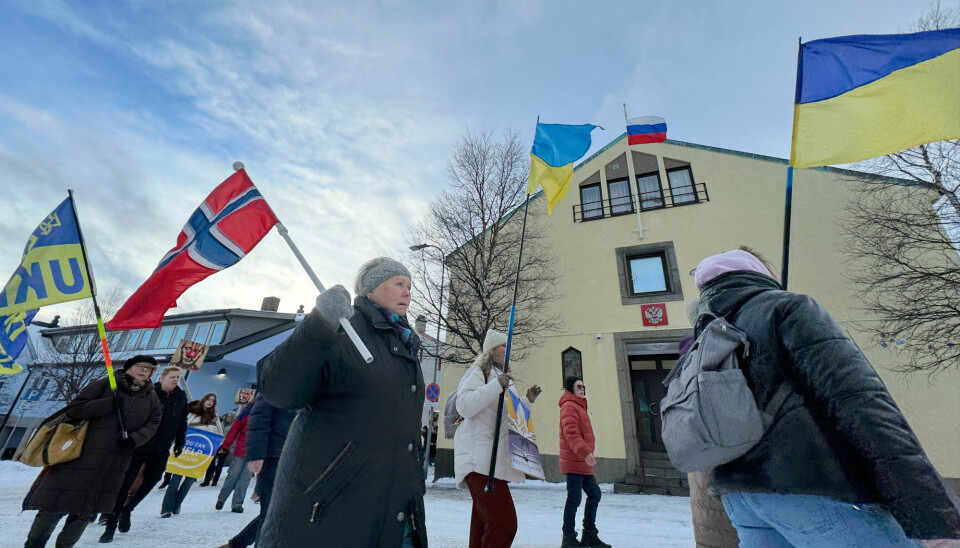
Aleksandr from Nikel used to go shopping in Kirkenes. Then he went to war
He is one of several hundred men from the Russian border towns near Norway and Finland that went to Ukraine to kill Ukrainians. Aleksandr Karpov never came back.
The 46-year-old man looks happy as he walks around in the Norwegian border town of Kirkenes. He pays a visit to the local shopping mall and smiles on a photo taken on the town square. Like so many people from Nikel, the Russian town located only an hour's drive away, he finds Kirkenes to be a popular destination. The small Norwegian town can offer good shopping deals and a friendly atmosphere.

A video on Aleksandr's social media page clearly shows that the man enjoyed the place.
The clip was posted in August 2021 when it was still easy for Russians in Nikel and other towns in the Kola Peninsula to make it across the border to Norway. The Nordic country had relaxed visa regulations and border-crossing was easy.
Kirkenes and Nikel had been 'friendship towns' for three decades and locals on both sides were used to visiting each other.

But the friendly atmosphere was about to turn seriously sour. The increasingly assertive position of the rulers in Moscow had since 2014, and even before, fundamentally challenged the Norwegian desire for normalisation in cross-border relations.
Only a few months after Aleksandr Karpov was photographed in downtown Kirkenes, Russia went to full-scale war. The invasion changed everything, and a deep freeze soon descended on cross-border relations in the North, like in the rest of Europe.

Aleksandr Karpov probably never made it to Kirkenes again.
Judging from his social media page, the man probably worked in a construction company. He had a family, parents and kids. And a dog. On several photos he is seen hugging his mother Irina. She also used to be an eager border-crosser, photos show.
Aleksandr liked snowboarding and regularly visited the slopes outside Nikel. He probably also liked to go fishing.
But Aleksandr Karpov also had some serious personal problems. Information from the local court in Pechenga shows that he had been charged at least seven times. The last time was on criminal charges in late 2023.

It is not clear exactly when Karpov went to war. But it must have been after December 2023. It is also not clear whether he himself signed up for a contract the ministry of war or he was mobilised.
On October 7, 2025, two days after his 50th birthday, Karpov was reported killed.
He is one of several hundred thousand Russian men that have vanished in the war. And one of many hundred from the Kola Peninsula.
The Barents Observer has compiled a list with the names of more than 700 men from the Murmansk region killed on the battlefields. At least 16 of them were from Nikel, and another 25 from the neighbouring town of Zapolyarny.
The actual number of men killed is far higher. Only a part of the casualties have been accounted for. Thousands of Russian bodies remain on Ukrainian soil.
Many of the men from Nikel and Zapolyarny were sent to war as part of Russia's partial mobilisation announced in September 2022. Videos show how locals from Nikel and Zapolyarny in the early morning of September 28 and October 13 were sent off on buses. Family and friends were at the assembly point to say good-bye.
"Everything will be fine," a father told his son.
"Take care, see you soon," a man can be heard telling his friend.
Russian patriotic songs played loudly from a speaker as the buses packed with local men set off.
On site was also local Mayor Andrei Kuznetsov. He later recalled how the events proceeded.
"I remember each of those days when, at 5 a.m., the Pechenga District saw off the first young men called up for mobilisation. Citizens from the reserve were sent to a training unit based at one of the Russian Ministry of Defence's educational institutions in St. Petersburg. They then continued to serve in territorial defence units and subunits. Our men were seen off by their closest friends and family. The municipal administration purchased gift bags, which we gave to the soldiers before their departure. I promised all the young men leaving for the front that we would provide all the help and support their families needed in everyday matters."
Kuznetsov was at the time driving around with a car marked with a 'Z,' the letter used as Russia's symbol of war.
The videos showing the local men setting off to war got dozens of comments on social media. Most wished the men good luck and safe return. But among the more than 70 comments was one critical voice. A woman named Vika expressed alarm.
"The wildest farewell, in my opinion, is ‘Come back alive, safe and sound!’ I really want to ask you all: ‘Do you really understand where they are going?!’ I don't know what fairy tales you are being told, but it seems to me that you don't realise what is happening."














